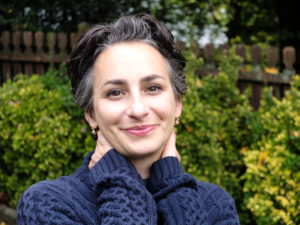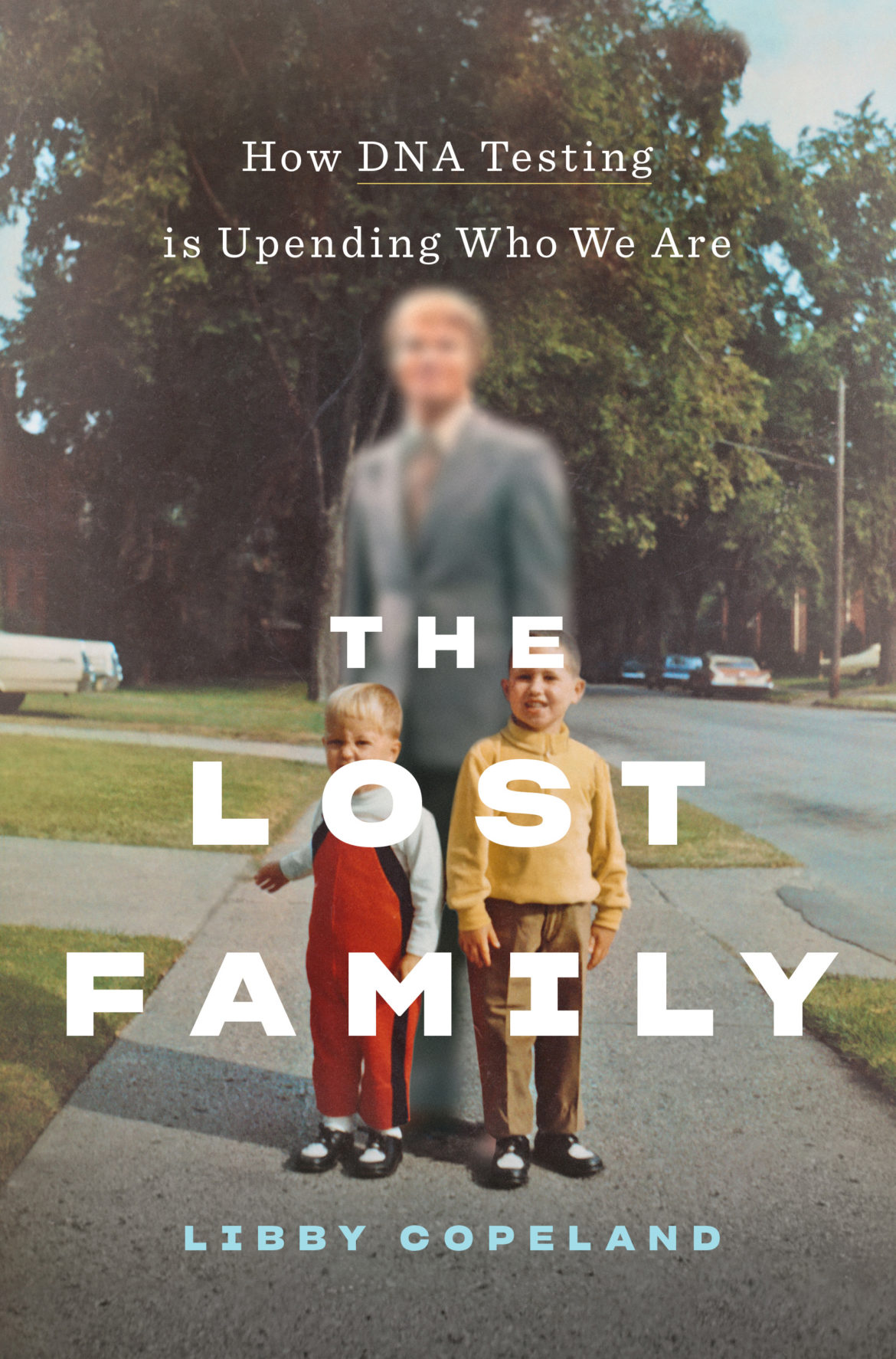Libby Copeland’s exhaustively researched new book is a compelling look at the genetic minefields DNA testing has planted.
By B.K. Jackson

Libby Copeland
Just over a decade ago, when autosomal DNA tests first hit the market, offering consumers a new tool for advancing genealogical research and a way to discover genetic cousins, few imagined how popular these tests would become. In this short span, more than 30 million Americans have traded a hundred bucks and a spit or swab sample of DNA for a backward glimpse into their ancestry.
The majority of testers get precisely what they pay for—a pie chart indicating their ancestral heritage and a list of DNA cousin matches. They learn from whence and from whom they came—information that makes them feel better connected to their forebears and more knowledgeable about themselves in some essential way. Countless others, however, get much more than they bargain for and—sometimes—more than they can handle. For these consumers, DNA testing leads to a genetic disconnect from their families and the erasure of an entire swath of their self-knowledge. They discover that they’re genetically unrelated to one or more of their parents.
Even more shocking than the existence of these genetic disconnects is their sheer numbers. Although no one knows exactly how many testers have discovered misattributed parentage—and estimates within the general population are likely overstated—headline after headline and the swelling ranks of secret Facebook groups devoted to supporting those disenfranchised from their families suggest the numbers are significant.
These genetic seismic events are only part of the reason many view direct-to-consumer DNA testing as a Pandora’s box. Just as no one could have guessed how many genetic identity crises might arise in the wake of testing, the depth and breadth of the potential repercussions were unimaginable, as were the contours of the ethical and moral dimensions.
More than anything, the widespread availability of DNA tests has created a nation of what Libby Copeland, in her extraordinary new book, calls seekers. Although rigorously researched and dense with information, “The Lost Family: How DNA Testing is Upending Who We Are,” is a page-turner. The author, an award-winning journalist, crisscrossed the country talking to industry leaders, educators, and influencers. She immersed herself in the wide world of DNA testing, followed debates on social media, and attended conferences, and yet she wondered whether the velocity of change in the industry was so great that even she couldn’t keep up. And at the same time, she worried that the media saturation about DNA testing was so thorough that what she’d learned was already old news. “But then I would remember that I was in a bubble,” she writes. “The people who were getting DNA kits for Christmas had no idea what was coming for them. And the ramifications of what they might find would not be short-lived; rather they amounted to a fundamental reshaping of the American family. It was something they would deal with for the rest of their lives and pass on to the generations that follow.”
I thought I knew a great deal about DNA testing and had a reasonable grasp of its myriad ramifications until I read “The Lost Family,” in which Copeland expertly drives home how much bigger the subject is than most of us—even those of us deeply affected—realize. She takes readers through the history of genetics and all of its promise, then explores equally its dark side—eugenics and the dangers of genetic essentialism—and considers the broad range of ethical minefields planted by present day DNA testing. “One of the central conundrums of spitting into a tube is the way one person’s rights so often collide with another’s after the tube is sealed and sent in,” Copeland observes. And so many rights are at stake—from the right to privacy with respect to genetic data to the right of offspring to know who their parents were and what their health risks might be.
As she delved deep into her research, Copeland came to believe “we are embarking on a vast social experiment, the full implications of which we can’t yet know.” But what follows suggests that the boat left the dock some time ago and is churning in choppy waters. While the full implications are beyond imagining, the author does a stellar job of exploring the implications that have become apparent. She dissects DNA testing and explores it from every aspect, mapping the perspectives of all involved—the test makers and takers, the lawyers, the genetic and forensic genealogists, the ethicists who ponder the ramifications, and the people who are on the receiving end of contact from test takers—and shows what the stakes are for each.
As intriguing as all that is, Copeland is nowhere more captivating than when she’s telling the stories of the seekers—the “people obsessed with figuring out just what’s in their genes”—and follows them down the rabbit holes that swallow them as they try to figure out where they come from. She categorizes seekers into three groups: avid genealogists for whom DNA testing is just an extension of their research; those propelled by suspicions that something is off-kilter in their families or who know they have biological family to find, such as adoptees, donor-conceived people, and other NPEs; and the hapless folks who tested for “recreational” purposes and were rocked by a finding they never saw coming.
Copeland spoke to more than 400 such seekers during the course of her research, and she braids many of their stories throughout the text to illustrate why and how people seek and the ways their lives are changed by the pursuit of truth. There’s the geneticist who found that the man she believed was her father was not genetically related. There’s the foundling who had been placed in a basket and left in front of the home of a pastor. There are the seekers who search and are shut out by their biological relatives. There’s the woman in her fifties who developed symptoms that might have been related to ovarian cancer. She’d recently been given information suggesting she was half Ashkenazi Jewish, which meant she might have a BRCA1 or 2 variant, increasing her risk of breast and ovarian cancers. A medical grade DNA test didn’t suggest that she had the variants, but her doctors thought a radical hysterectomy was still warranted by her Ashkenazi heritage. She took a DNA test to learn more about that heritage, and the results showed she had no Ashkenazi ancestry. She discovered she’d been adopted. The worst part, perhaps, was that others in her family knew and didn’t stop her from having the surgery.
But the anchor of the book is the story of Alice Collins Plebuch, a super tech nerd who used her exceptional skills in a two-decades’ long quest to learn more about her family history only to stumble on a spectacularly thorny family mystery. “It is a strange thing to look in the mirror at the face you’ve grown old with and find you don’t quite recognize it,” she told Copeland.
And through Alice’s efforts to understand her unexpected DNA test results, Copeland, weaving her story throughout the book, traces the genesis of a seeker. “Even if you didn’t mean to ask the question, once it’s asked, it will be answered. And once it’s answered—well, for many people, there’s something pretty compelling about knowing there’s a mystery man out there who gave you half your genetic material. How do you not open that box? How do you not want to see your face in his, or to hear the timbre of is voice? How do you not wonder: Would he like you? Would he be glad you came into his life? This is how seekers are made: One question lead to another.” But, she’s quick to observe, there’s no telling how the objects of one’s quest will respond to those questions—an uncertainty that drives an enormous amount of anxiety and, potentially, trauma, for which, she adds, there’s a dearth of supportive services.
These stories involving DNA testing, Copeland says, reveal “how it can delight—and how it can disappoint.” And through them she’s able to pose the big questions:
Is it better to know the truth a test reveals?
Who owns a secret?
What does it feel like to have been lied to?
What is it that forms identity? Is it cultural or biological?
What is it that makes family? Is it blood or care?
Oddly, one of the book’s numerous strengths is that it raises many questions Copeland can’t answer but that provoke thought and debate. “The rise of consumer genomics poses questions about the emphasis we put on genetic identity and what we do when DNA test results come into conflict with the narratives we’ve long believed about ourselves,” she says. “How much of your sense of yourself should scientists and algorithms be allowed to dictate?” And further, “Who decides what story we get to tell?”
Legions of test takers will nod in recognition when Copeland acknowledges the fundamental pain many seekers experience. “Secrets, we are all discovering, have a propulsive power all their own, and time and complicity only make them more powerful.” She manages to look at the toxicity of secrets from all sides. “DNA testing has brought the past forward to the present, forcing us to grapple with decisions made long ago in different, often desperate, circumstances. If forces us to think about the people whose truths have been hushed up for decades—the teenager consigned to a home for unwed mothers, the medical student who contributed his sperm, never dreaming that sperm would become a person knocking on his inbox five decades later.”
Copeland has managed to unravel the enormous knot of a deeply complex subject—the “profound and disruptive power of DNA testing.” She’s broken it into comprehensible parts and parsed their meaning and import. “The Lost Family” is essential reading for everyone who has taken or is considering taking a DNA test, and it will be illuminating to anyone with a stake in genetic identity issues. But because Copeland’s analysis is so thorough and deeply thoughtful, and because it will humanize and contextualize genetic identity issues for those who haven’t yet been touched by them, the book should be read by everyone. No one is immune to the reach of DNA testing. Ultimately, everyone will be affected in one way or another by this phenomenon. The information contained in this excellent book will help readers make informed decisions about testing and, equally, once they’ve tested, will prepare them for the fallout when “the roulette wheel of some unexpected revelation” stops at their families.




